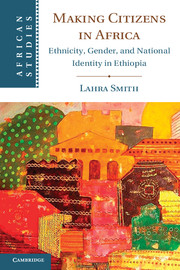Book contents
- Frontmatter
- Contents
- Maps and Tables
- Acknowledgments
- Abbreviations
- Glossary
- Maps
- Introduction
- The Challenge
- 1 Comparative Perspectives on Citizen Creation in Africa
- 2 The Historical Context for Modern Ethiopian Citizenship
- The Response
- Appendix I Methodology
- Appendix II Questionnaire for Parents and Community Members (English)
- Appendix III Questionnaire for School Directors
- Appendix IV Questionnaire for Teachers
- Bibliography
- Index
2 - The Historical Context for Modern Ethiopian Citizenship
Published online by Cambridge University Press: 05 May 2013
- Frontmatter
- Contents
- Maps and Tables
- Acknowledgments
- Abbreviations
- Glossary
- Maps
- Introduction
- The Challenge
- 1 Comparative Perspectives on Citizen Creation in Africa
- 2 The Historical Context for Modern Ethiopian Citizenship
- The Response
- Appendix I Methodology
- Appendix II Questionnaire for Parents and Community Members (English)
- Appendix III Questionnaire for School Directors
- Appendix IV Questionnaire for Teachers
- Bibliography
- Index
Summary
In a 2003 revision to the civics curriculum in Ethiopia, middle and high school students are introduced to a radical reordering of Ethiopian history and social life. In the second chapter entitled “The Rule of Law,” students are told that “before 1974, the political system in Ethiopia was set up on the basis of the divine right of kings. Monarchs claimed to be elects of God. Such belief helped the monarchs establish absolute power over their subjects by monopolizing legislative, executive and judiciary powers.” In the next chapter, students are taught that, because of the change of government in the early 1990s and the subsequent revision of the constitution,
the Constitution of the Federal Democratic Republic of Ethiopia (FDRE) became the first charter of equality in Ethiopian history…. The major purpose of the FDRE government is to secure the peaceful co-existence of Nations, Nationalities and Peoples who consented to live together on the basis of equality and other principles of democracy. These principles and values … are designed to protect not only individual members but also the rights of all Nations, Nationalities and Peoples of Ethiopia as a whole.
- Type
- Chapter
- Information
- Making Citizens in AfricaEthnicity, Gender, and National Identity in Ethiopia, pp. 44 - 88Publisher: Cambridge University PressPrint publication year: 2013

